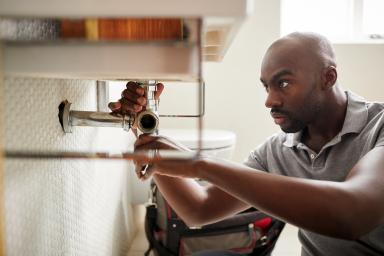What does it cost to start a business?
One major consideration when launching a business is establishing how much money you need. It can be difficult to know! Read our guide to find out what it really costs to start a new business in the UK.
Starting a business can feel like a giant leap into the unknown, and one of the biggest challenges entrepreneurs face is identifying how much money they need for their start-up.
Start Up Loans spoke to new business owners to determine how much money you need to start a business and the hidden costs to watch out for.
If you're thinking of starting a business, you must identify potential costs and think about how you can fund your new venture.
While it's true that some companies can be started for free or with just a little money, others require a chunk of cash to get them from idea to reality.
Small businesses face a range of start-up costs, and these can vary wildly depending on the type of business and skills and experience of the owner.
Some costs - such as incorporating a business or buying insurance - are reasonably easy to factor in to your business plan.
Other costs, like buying PPE equipment if your business requires it, will be based on how busy your business gets.
Calculating your start-up costs
While each start-up is different, all new business owners should create a financial plan for the year ahead.
A financial plan can help you estimate how much money you need to launch your business and operate its first year of trading.
“Any business will always cost more than you think,” advises Emily Robertson, co-founder of Roundwood Gin, which was set up in 2018 in Cambridgeshire with the help of a £25,000 Start Up Loan.
“There will always be costs that get thrown up which you haven't predicted. I did detailed financial planning for the first year and made sure I had some sort of contingency built into it.”
Our free financial planning templates can help you successfully plan your business.
What are typical start-up costs?
Brainstorm a list of all the things you'll need to spend money on. These can be costs required to launch your business and subsequent costs to run your business in the first year.
Costs will vary depending on your business and may include the following:
1. Incorporating and registering the business
Depending on the business structure you plan to use, you may need to pay to register your business. It costs £50 to register a limited company online or £71 by post.
It costs £170 to trademark your business name, plus £50 for each additional class you want the trade mark to cover.
“I had to spend a lot of money on copyright at the start,” says Miles & Mia author Michaela Alexandra, who launched her book brand with a £9,000 Start Up Loan. “That was very important in the long term.”
2. Professional fees
Fees may cover accounting and financial advice, insurance, licences and legal costs.
You may need to take out insurance for your new business - for example, public liability insurance if your business deals with the public, or professional indemnity insurance if you operate a business consultancy.
Prices vary dramatically, with a hairdressing salon paying around £350 per year for public liability insurance, to a marketing consultancy paying around £500 for indemnity insurance.
Accountants will charge for activities such as filing annual returns and running staff payroll, but many will be happy to give new businesses some free advice.
“A lot of accountants will offer a free initial consultation,” says Daniel Edwards of D&K Accounting, which he founded in 2016 with a £25,000 Start Up Loan.
“Even at the planning stage of starting up, I would suggest getting an accountant. When going through the Start Up Loans application process, for example, you'll be asked for cash flows and your profit and loss for the first two years. Having an accountant help you go through that and actually understand whether or not the business you're looking to do is viable, is a fairly important part.”
3. Premises
From market stalls and retail units to office space and workshops, you'll need to factor in space for your business to operate. Location, size, terms of the lease and amenities such as serviced offices will affect costs.
Office prices per square metre range from around £20 in Bristol to £90 in London's West End, according to 2021 research by Statista, with retail units pricing per square foot ranges from £100 in Bristol to £2,175 in London's Bond Street.
4. Marketing costs
These range from building a business website to marketing activities such as email, pay per click and placing ads in local newspapers or trade magazines.
Creating a website can cost anywhere between £240 and £60,000, with annual running costs of up to £2,000.
Marketing costs range from 9% to 25% of company turnover, with start-ups typically spending a higher percentage of their turnover on promoting their business and winning customers, according to a report by Deloitte (.PDF, 1.8 MB)(Opens in new window).
A study by Gartner (.PDF, 864 KB)(Opens in new window) found that around two-thirds of marketing costs are on digital marketing.
5. People costs
Employees, freelancers, contractors, and your salary all need to be properly costed in.
When starting, look to outsource expertise on a project basis, such as public relations (PR) or accounts. Day rates vary but expect to pay around £100 to £200 per day for a freelancer.
You shouldn't overlook your salary and financial needs when working out your business costs.
As D&K Accounting's Daniel Edwards says: “People need to understand what they need to earn themselves and work out how much the business needs to generate to provide that for them.”
6. Equipment and plant
Equipment is a capital expense for your business and ranges from laptops and office chairs to machinery. Don't be tempted to splurge on expensive computers or fancy furnishings.
Buy second-hand where possible, and only spend what you need on equipment.
Tools and machinery vital for your business are a different matter, and you should factor in additional costs such as maintenance.
7. Materials and supplies
Materials are the components used in the products or services you supply, such as ingredients or construction materials.
Shop around for suppliers to research prices and see if discounts for bulk purchases are available. While costs vary, regularly review suppliers and negotiate more favourable pricing.
Plan for unexpected start-up costs
No matter how well you plan, you'll need to allow for contingencies to cover unexpected costs.
“I think if you've done your budget, and you've accounted for everything that you have planned, and it comes in at a low amount - say £1,000 - then you're in for a surprise,” says Jane Crane, founder of immersive paint experience Your Tribe in Newcastle, which she launched with a £20,000 Start Up Loan in 2019.
Launching a new business can mean you need to cover unexpected problems. “If your business isn't the type that has immediately got income coming in, you've got to give it time to build as well fix any problems.”
With Jane's business, for example, she quickly realised that she needed specialist flooring to prevent accidents.
“There was a problem with people slipping, which ended up costing a fortune as I had to get really expensive flooring. It became apparent immediately that I couldn't wait for another session to go on before I got the right flooring.”
Daniel Edwards of D&K Accounting agrees that business costs can be unexpectedly high. “Take the number that you're thinking of and at least double it. There's always something else that that needs paying for. Insurance can be quite high, subscriptions and so on all mount up, and that's before you start thinking about stock. When starting, suppliers are going to want cash on delivery - you won't be able to agree on credit terms at this stage.”
For Roundwood Gin's Emily Robertson, it's the little costs that soon add up. “There are costs that you don't consider, such as transaction fees selling online or subscriptions for your e-commerce platform. There are more hidden costs to each sale that you probably haven't considered in your running costs.”
However, with careful planning and some cash in reserve as a contingency, your business could be prepared for any unexpected costs.
Being realistic about the real cost of starting-up can help your new venture be more sure-footed during its early stages, and can help boost your chance of success.
Want to learn how to manage your start-up’s finances? Check out our free online courses in partnership with the Open University on being an entrepreneur.
Our free Learn with Start Up Loans courses include:
- Introduction to bookkeeping and accounting
- Companies and financial accounting
- Financial methods in environmental decisions
Plus free courses on finance and accounting, project management, and leadership.
Disclaimer: The Start -Up Loans Company makes reasonable efforts to keep the content of this article up to date, but we do not guarantee or warrant (implied or otherwise) that it is current, accurate or complete. This article is intended for general information purposes only and does not constitute advice of any kind, including legal, financial, tax or other professional advice. You should always seek professional or specialist advice or support before doing anything on the basis of the content of this article.
The Start-Up Loans Company is not liable for any loss or damage (foreseeable or not) that may come from relying on this article, whether as a result of our negligence, breach of contract or otherwise. “Loss” includes (but is not limited to) any direct, indirect or consequential loss, loss of income, revenue, benefits, profits, opportunity, anticipated savings, or data. We do not exclude liability for any liability which cannot be excluded or limited under English law. Reference to any person, organisation, business, or event does not constitute an endorsement or recommendation from The Start-Up Loans Company, its parent company British Business Bank plc, or the UK Government.
Your previously read articles
Apply for a Start Up Loan
We've helped over 100,000 businesses get off the ground with a Start Up Loan. Can we help make your business dream a reality?
Find out more for a start up loan
Essential guide to starting a business
Our Essential Guide to Starting a Business is your roadmap to turn your business idea into a reality.
Across 12 chapters, you'll discover a wealth of information designed to empower and equip you with the knowledge needed to successfully launch and manage your new venture.
Sign up for our newsletter
Just add your details to receive updates and news from Start Up Loans
Sign up to our newsletter


